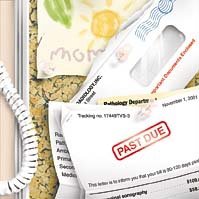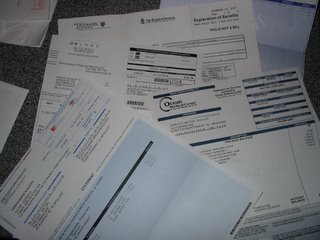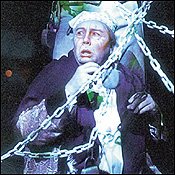
Cancer treatment brings many stresses, many of which I've written about in this journal. One stress I haven't mentioned yet is dealing with the bills.
Over the past several months, I haven't been paying very close attention to the bills that have been arriving. I've let them pile up. Presbyterian ministers like myself have pretty good medical insurance – Blue Cross/Blue Shield coverage provided through our denomination's Board of Pensions. So, I know the first step is letting the insurance pay on these. That takes a number of weeks.
For each bill, there's a corresponding mailing from Blue Cross/Blue Shield – the Explanation of Benefits (EOB). This explains the detailed rationale behind the insurance company's decision of what to fund, and how much. Usually the insurance company negotiates a special rate with the doctor, hospital or lab – so, the revised bills indicate an adjusted starting figure, from which the insurance payment is then subtracted, leaving a new "bottom line." The original amount billed has little relation to reality: it's complete and utter fiction. This means the only appropriate thing to do with a new medical bill is to ignore it for a while.
 Each doctor, hospital or lab has a slightly different way of accounting for expenses – so, while the EOB forms are pretty standard, comparing them to the medical bills is a challenge. Those bills are infamous for fuzzy, imprecise language, arcane abbreviations and numerical codes for which no explanatory key is provided.
Each doctor, hospital or lab has a slightly different way of accounting for expenses – so, while the EOB forms are pretty standard, comparing them to the medical bills is a challenge. Those bills are infamous for fuzzy, imprecise language, arcane abbreviations and numerical codes for which no explanatory key is provided. I don't know how this strikes other people, but to me this is an absolutely crazy system. The amount of time, money and energy spent in this country on medical financial record-keeping can probably never be measured. One estimate I heard is that forty cents of every medical dollar spent in the U.S.A. goes to record-keeping. That same estimate included figures for Canada, which has a national health-care system: it's supposedly five cents on every dollar up there.
I don't know how this strikes other people, but to me this is an absolutely crazy system. The amount of time, money and energy spent in this country on medical financial record-keeping can probably never be measured. One estimate I heard is that forty cents of every medical dollar spent in the U.S.A. goes to record-keeping. That same estimate included figures for Canada, which has a national health-care system: it's supposedly five cents on every dollar up there.Unlike many Americans, I've actually been a participant in a so-called "socialized medicine" system. During two different years when I studied in Britain (at Oxford and St. Andrews), I was covered under National Health. While, as a young and healthy university student, I didn't have too much need for health-care services, I did have some experience with British medical providers – and it was all very favorable. One thing I can say: Scotland is the only place I've ever had a house call from a doctor.
I know, from conversations with nurses and other health-care professionals, that they all feel snowed under with paperwork. Patient care suffers, as a result. Once, America had the finest health-care system in the world. We're still up there in terms of quality, but I think we've lost our pre-eminent place. The thing that's pushed us out of first place is the health-care funding mess. Doctors today are disturbingly like the pathetic figure of Marley's Ghost in Dickens' A Christmas Carol: they're shackled with the chains and money-boxes of all the armies of accountants they have to deal with.
 There's a certain cost to patients as well. There's a legitimate concern about all the time doctors and nurses must spend on accounting paperwork, but nobody seems to want to talk about the untold hours that patients and their families must spend puzzling out their medical bills. I know that, in the next few weeks, I need to attack that small mountain of bills. I'm hoping the window between now and my next chemo treatment lasts long enough for me to make some progress on this. Somehow, I've got to sort out which bill matches up with which EOB, check them both over for errors, and begin to make payments.
There's a certain cost to patients as well. There's a legitimate concern about all the time doctors and nurses must spend on accounting paperwork, but nobody seems to want to talk about the untold hours that patients and their families must spend puzzling out their medical bills. I know that, in the next few weeks, I need to attack that small mountain of bills. I'm hoping the window between now and my next chemo treatment lasts long enough for me to make some progress on this. Somehow, I've got to sort out which bill matches up with which EOB, check them both over for errors, and begin to make payments.Is it therapeutic to have to do this when you're sick? Hardly. But what choice is there? It's not only the doctors who are all wrapped up in chains like Marley's Ghost. The patients are, too.
2 comments:
Amen, Amen, AMEN!
The one thing I've been avoiding the past couple of weeks is straightening out the 2 bills that I have to appeal from my surgery -- last October! (Now, of course, any late-received bills also incur my 2006 deductible.) These 2 bills alone have generated nearly 1/2" of paper . . . and I haven't even responded yet, except by phone, so my appeal isn't even included!
I find the paperwork unnecessarily confusing, and can't imagine how anyone living with symptoms that might include confusion, dementia, or memory loss can possibly navigate this system without help.
Yes, we all pay for it - the patient, the doctor, and MOST ESPECIALLY the hospital nursing staff. Just try to get a medication while they're "doing reports" . . . the patient has to time their request not just to their own need, but to the nurses' schedules. Please, all nurses out there, this is not a complaint against you . . . but the paperwork is managing the medical care.
Sorry - you really hit a nerve, describing piles of forms and the energy required to address them, WHILE trying to heal.
Robin (no veiled identity here!)
Carl: You hit this nail right on the head. I have worked with people that have had actual shopping bags full of bills and EOB's. To make matters worse, so many people are so baffled by the system that they will pay the bill even if they don't owe it. In that case, the doctor or hospital will keep your money until you call and request a refund. Most people don't even realize that they overpaid, so, the refunds never happen. Another problem is the avalanche of bills from doctors, radiologists, labs, etc that you can't remember ever having met or had contact with. Please don't let them intimidate you. Concentrate on getting well, the rest can be dealt with later. Thanks for keeping us up to date with your blog. I'm keeping you in my prayers. Joann
Post a Comment